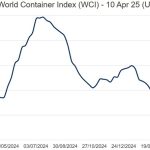The Drewry WCI composite index rose 3% to $2,265 per 40ft container, 78% below the previous pandemic peak of $10,377 in September 2021. However, the index was 59% higher than the average $1,420 in 2019 (pre-pandemic).
The average YTD composite index closed at $2,944 per 40ft container, $55 higher than the 10-year average of $2,889 (inflated by the exceptional 2020-22 Covid period).
Freight rates from Shanghai to Rotterdam increased 4% or $88 to $2,392 per 40ft container, and those from Shanghai to Los Angeles rose 3% or $89 to $2,815 per 40ft container. Similarly, rates from Rotterdam to Shanghai and Shanghai to New York swelled 2% to $475 and $3,976 per 40ft container, respectively.
Likewise, rates from Shanghai to Genoa and Rotterdam to New York increased 1% to $3,071 and $2,153 per 40ft container, respectively, whereas rates from New York to Rotterdam decreased 1% or $7 to $824 per 40ft container. Meanwhile, rates from Los Angeles to Shanghai remained stable. In the coming weeks, Drewry expects rates to increase due to tariffs and reduced capacity.
 For more information:
For more information:
Drewry
Tel: +44 (0)207 538 0191
Email: [email protected]
www.drewry.co.uk



